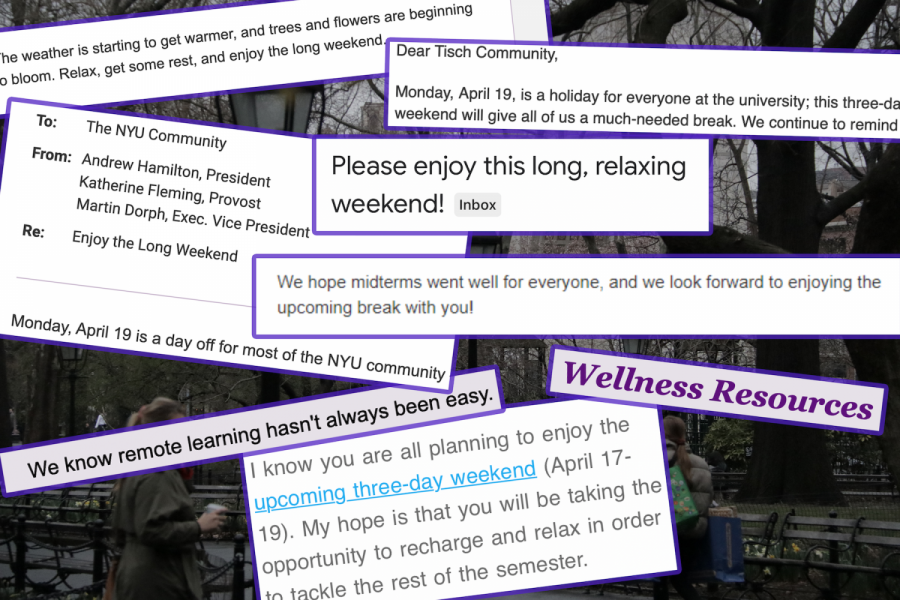Burnt-out students argue they deserve a normal spring break
NYU deans encouraged students to use Monday as a single-day spring break, but many students argue this is a poor remedy for their deteriorating mental health.
Another spring break weekend is heralded by University administration. NYU students share their thoughts and feelings about how break is handled this semester. (Staff Photo by George Papazov, Staff Illustration by Alexandra Chan)
April 16, 2021
Students continue to feel burnt out and unsupported by the university, as WSN previously reported.
To ameliorate the issue, college deans from multiple schools sent emails last week encouraging students to contact them, if professors assigned homework or exams during the spring break weekend on April 19.
“[Our goal is] to eliminate what we unfortunately witnessed during our first long weekend of March 19-21,” College of Arts and Science Dean Gene Jarrett wrote in an email to CAS students. “A few instructors had assigned coursework or scheduled exams or assessments right afterward, each interfering with your ability to get the deserved break you need and that we all were expecting in light of the resolution passed by the University Senate.”
Despite deans assuring students that Monday is meant for taking a break and confirming that they should not have homework, the burden of a full courseload and a pandemic are taking their toll.
Liberal Studies first-year Rachel Lawal believes the weekend spring break is an inconsiderate and inadequate move by the university, since she will spend a large portion working and the rest catching up on late assignments.
“I shouldn’t have to feel ashamed for taking an hour out of my day to relax, but I am,” Lawal wrote to WSN in an email. “I shouldn’t feel ashamed for not working while I eat, but I do.”
Stern senior Sungani Dlamini agrees with Lawal, thinking the two long weekends are inconsequential compared to the entire semester.
“I also didn’t know Monday was spring break, because at this point it’s just so insignificant,” Dlamini told WSN. “In terms of courses, I do not see a difference. I’m exhausted.”
A letter from University President Andrew Hamilton and Provost Katherine Fleming in October announced the university’s rearranged spring schedule. It included canceling the normal spring break week and introducing two three-day weekends scheduled March 19 and April 19.
The letter explained that giving students a week off would allow them to travel and potentially spread COVID-19 throughout the university and neighboring communities. Regardless of the university’s reasoning, students continue to travel.
According to NYU spokesperson Shonna Keogan, the cancellation of spring break successfully reduced student travel.
“Case positivity rates were highest here on campus in January, when many of our students traveled back to campus after winter break,”Keogan wrote in a statement to WSN. “Recently, we’ve seen our rates go down and it’s important to sustain that progress.”
According to NYU’s COVID-19 Testing Dashboard, the test positivity rate on a 14-day rolling average hovered around 1% from mid-January to early February, before steadily decreasing to about 0.3% in mid-March. In late March, after the first spring-break weekend, the positivity rate nearly tripled, jumping to 0.81%, as WSN previously reported. The test positivity rate was 0.58% at press time.
Multiple students said that even if some people may travel, everyone deserves a week-long break for their mental health.
“I know the main concern the university had was, ‘Oh, students are going to travel’” Dlamini said. “I can genuinely say, wholeheartedly, I really just wanted to rest — like, sleep.”
The university offers the Wellness Center for students, but a Tisch senior who asked to remain anonymous does not believe these resources are helpful.
“I feel like they’re always pushing the Wellness Center,” they told WSN. “That’s not really what I need. I have counseling, I have resources outside of school. I genuinely just need a break.”
Whenever she attempts to relax, Lawal said, the guilt of relaxing as opposed to doing work consumes her. She believes this isn’t fair — especially as a low-income student working 16 to 30 hours a week to pay her expenses.
“Here I am, basically dying for the conclusion of my first semester at college, burned out beyond all past experience,” she said. “All I need is a week.”
Email Rachel Fadem and Kayla Hardersen at [email protected].



























































































































































Justice Edmonds • Apr 26, 2021 at 11:23 am
I think we should have a normal spring break because people have alot to catch up on and have stuff to do with family. But we dont because some times we have school work in the ways and we want be able to do alot during it. So i think they should give us 2 weeks off to do what we want and we be good for the rest of the year